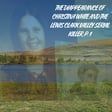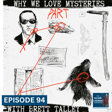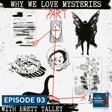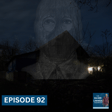Become a Creator today!Start creating today - Share your story with the world!
Start for free
00:00:00
00:00:01

90. The Death Gabby Petito and the Birth of a Movement with Nichole and Jim Schmidt
Gabby Petito's parents, Nicole and Jim Schmidt, join us to talk about Gabby, a 22-year-old woman who was murdered by her fiancé while they were traveling together on a "vanlife" journey across the United States. Jim and Nichole also discuss their efforts to tackle the challenges of domestic violence and missing persons cases through their foundation.
Check out the Silver Linings Handbook website at:
https://silverliningshandbook.com/
Check out our Patreon to support the show at:
https://ww.patreon.com/thesilverliningshandbook
Visit the Silver Linings Handbook store to support the podcast at:
https://www.bonfire.com/store/the-silver-linings-handbook-podcast-store/
Transcript
Being a Supportive Friend in Abuse Cases
00:00:00
Speaker
I think just reminding if you have this feeling that something's going on with a friend or family member, if you're not sure, you hear them say things or they're acting a certain way,
00:00:12
Speaker
and You don't want to ask those questions straight out when you're being abused um because that's a hard question and they're probably not going to answer it. They might get mad at you, whatever. yeah Just be that good friend and remind them, just like you said, hey, just so you know, if you ever need to talk to me about anything, I'm here. and You can never tell me anything that I would judge you for. you know just being that open good person for them that safe person and they might not open right up right away but eventually they might use you as the person to come to and that's important to have someone. That's Nicole Schmidt, the mother of Gabby Petito and the president of the Gabby Petito Foundation. ah She's brought on. I think the number is something like the average is like seven times before
00:01:01
Speaker
ah Most are able to to leave and for for all those reasons we discussed, but more times than not, you know they're either fighting for their own life to stay alive because they know how to navigate. Sometimes they abuse her to either lessen the impact. It becomes their normal, honestly. and or you know They're just not in a position. you know It knows no socio-economical boundaries, no race. right religion it doesn't matter like everybody's affected by it and so you know think of somebody that is like of of um a higher prominent status that is held on this level and this is the life that they've been leading. You know in you know in front of everybody but behind closed doors is a completely different life and now you know they need to leave and then you know well everybody loves the abuser is a great guy.
Introduction to the Podcast and Key Issues
00:01:53
Speaker
That's Jim Schmidt, stepfather of Gabby Petito and also a board member of the Gabby Petito Foundation. This is the Silver Linings Handbook podcast. I'm Jason Blair.
00:02:22
Speaker
At a time when a day doesn't go by where a woman goes missing in the United States or a moment where one is not a victim of domestic violence, Nicole and Jim Schmidt stand out for their dedication to raising awareness both about the signs and problems with laws related to domestic violence and the disparities that exist between the way certain missing persons cases are treated by law enforcement, the media, and the public.
Gabby Petito's Story and Domestic Violence Awareness
00:02:51
Speaker
Nicole and Jim are the parents of Gabby Petito, a 22-year-old woman who went missing in 2021 while living in a van on a part-time basis, hitting the open road to travel across the United States and posting the adventures of her and her boyfriend with the hashtag poundvanlife.
00:03:13
Speaker
The purpose of this van life was meant to cut down on stress, save money, live as minimalists, to connect with other van dwellers, to find a sense of community, and have the freedom to explore the world by having a moving home. But Gabby never came home.
00:03:33
Speaker
In 2021, the year Gabby went missing and was murdered, on average, nearly 20 people per minute were physically abused by an intimate partner in the United States, equating to more than 10 million people a year, according to the National Coalition Against Domestic Violence, a nonprofit focused on the conditions that lead to domestic violence.
00:03:56
Speaker
Their data says that one in four women and one in nine men reported experiencing severe intimate partner physical violence, intimate partner sexual violence, or intimate partner stalking with impacts such as injury, fear, post-traumatic stress disorder, and contraction of sexually transmitted diseases.
00:04:20
Speaker
Victims face beatings, burning, strangulation, and a wide variety of other forms of assault that their families and loved ones often have little to no idea about. About 20% of these domestic violence incidents involved a weapon, and when that weapon is a gun, it increases the likelihood of homicide by 50%.
00:04:41
Speaker
Those numbers are no doubt an undercount. Gabby was born to Nicole and Joe Petito on March 19, 1999 on Long Island. She was raised in Blue Point, New York, a small hamlet on Long Island of slightly more than 5,000 people where one-third of the households have children under 18.
00:05:04
Speaker
People go there for the good schools and excellent libraries and the beautiful views of the waters of the Great South Bay, which is so picturesque that has been the subject of Hudson School painters going back to at least the 1880s. This is the type of place where people go to feel safe.
The Impact of Gabby's Disappearance
00:05:25
Speaker
Gabby disappeared on a road trip across the country with her boyfriend in 2021 in a case that received international news attention and ended tragically in her body being found near a creek in Wyoming. Her disappearance led to a national manhunt that ended in her body being found by that creek and finding out eventually that her boyfriend was her killer.
00:05:53
Speaker
At first, Gabby's biological father, Joe, reacted negatively to the phrase missing white woman syndrome. But over time and reflection, they realized that there was an opportunity to create equity in the way that missing persons cases are treated. Jim and Nicole have set to address, among other things, the disparities in the way missing persons cases are treated based on ethnic origin and other statuses through the Gabby Petito Foundation.
00:06:23
Speaker
They've helped support efforts related to Black, Hispanic, and Native persons. persons They have also dedicated their time to building awareness about domestic violence. Today, we're gonna discuss the challenges of domestic violence in cases of missing persons, the systems that work against victims, and both the warning signs of abuse and why their foundation has put a laser focus on the disparities in the way that missing persons cases are treated.
00:07:10
Speaker
First, I wanted to thank both of you guys for coming on. that um For you listeners, this is ah Nicole and Jem Schmitt, who are the parents of Gabby Petito, and they also run the Gabby Petito Foundation. um you know At a time where a day doesn't go by, where we aren't hearing a story about someone who goes missing in the United States,
00:07:33
Speaker
And certainly, minutes don't go by where there isn't an act of domestic violence committed against against someone. and Nicole and Jim um have really dedicated themselves to raising awareness about domestic violence and also I think a great way to put it it is finding equity when it comes to the way that missing persons cases are treated and really advocating for a lot of families. you know My impression in looking at the work that you guys are doing is that you're not going to be happy until all missing persons cases are ah treated fairly.
00:08:10
Speaker
you know In brief summary, in 2021, Nicole and Jim's daughter, Gabby, went missing you know and ultimately, she was found dead in Wyoming. um This is the case that most of you guys are familiar with, that you've heard about.
00:08:32
Speaker
And, you know, a very tragic and sad story. And I think a lot of times when all of us are going through grief, it's really easy to get insular and not really find a way for something good to come out of it.
00:08:48
Speaker
and you know So both to you, Nicole and Gem, and just saying it generally, I appreciate the fact that you guys are doing it. I know it takes a lot of strength um in moments like this, and I know there are probably also good rewards to to bring something um good out of this. um I had the chance to meet TJ, your son, and on and have a real lovely conversation with him and I'm looking forward to talking to you guys today and I just wanted to thank you again for giving me your time and I really appreciate it. Thank you for having us. Thank you for having us. Absolutely. I wanted to go ahead and just open up by asking you guys a little bit about what it was like as parents.
00:09:42
Speaker
um you know When you first found out that Gabby was missing, cause I, you know, as someone in who has, I either have two or three boys, depending on how you count it. Um,
00:09:56
Speaker
worst nightmare, right? Like when when they get to the point where they can navigate the world for themselves as teenagers and they go out and I remember those fears, right? Like what is potentially gonna happen to them? And then it doesn't happen and it doesn't happen. And you worry less. um What was it like for you guys when you first realized that she was missing? Exactly how you described it. It it is a nightmare. it's um and And there's a lot of parents that are struggling and going through that as we speak, uh, cause we do see it every day and they are so scared, but you kind of work through that fear and you do whatever it is you need to do to find your child because that's important and you will go to the end of the earth. And I think that's exactly what we were doing yeah at the time. You just stay focused on, on them and trying and trying to find them.
Dealing with Grief and Advocacy
00:10:54
Speaker
The worry he never changes. I don't think, you know, I think now for us, it's even more elevated than ever with our other children. But, um, when, when you get that phone call or when it finally gets that happens, they report them officially missing. You just have to stay focused on doing what you can for them because it's your child and and and trying to do everything to find them. Yeah. I think in the moment you kind of like,
00:11:17
Speaker
You're in another world. Your brain is just focused hyper-focused on doing whatever it is you can. So you're looking at all the information. You're sifting through you know all the news stories, whatever you can do to find your kid. um it doesn't You don't feel it like at the time. You just feel focused. um You feel scared and and you feel tense, but hyper-focused and very vigilant on getting that kid home.
00:11:46
Speaker
Yep, yeah, yeah. You know, it's really interesting that you mentioned the part about, like, you'll do anything. You know, I've... um talked with people who have had a missing child. And I really believe they would spend their last time. They would spend they would do the shirt off their back, give up their car. And and you're right, they're very hyper-focused in the moment. And then I've seen, as the situation comes to resolution, whether that child is found or um you know it gets long enough,
00:12:21
Speaker
that you you know they're missing for long enough that they're a breather or a break or or you find out something really sad happened with them, that theyre there's this moment where sort of like all the emotions come rushing in and flooding in and you start feeling all those things you didn't. Do you guys go through something like that?
00:12:43
Speaker
um Trying to think back because you know obviously we went through the grief process um um when they found her. I cannot even imagine parents, and i've I've spoke to some parents that are going through this right now, um never finding them, just not finding them. that That's probably, I would think, worse. I think yeah we're grateful that we we got to bring Gabby home. and um I guess,
00:13:12
Speaker
For me, I kind of hit the ground running with I was i was so angry but so full of like this this need to do something to to help and to change things that I just i just kept moving.
00:13:26
Speaker
but um I can imagine that people fall into depression and and and go through their grief process differently and that's okay. Whatever ah grieving they have to do is what they have to do. But um for me, I had to just do something to help because Gabby's story was so big. It's not how the, and I think, I mean, you're making a really, I think an astute point is one of the things that I've learned over the years is like,
00:13:54
Speaker
There may be some wrong things to do when it comes to grief, but like in terms of how we grieve, there's no like one path for for any of us.
Gabby's Life and Independence
00:14:05
Speaker
um you know There's probably some people in their grieving, they probably could never do something like what you guys are doing, becoming advocates, and there's nothing wrong with that, and that's okay.
00:14:14
Speaker
hey um and you know but they there There's some people who really do get some true value out of it. um and you know I was going to ask you ah just a little bit about Gabby. I know that um it can be difficult to talk about some of these things, but I'm curious what you can tell me about. you know ah you know I had read a bunch of things about um her where people talk about her being vibrant and creative and free spirit and caring a lot ah about people and you know i read about her saving up to doing her traveling like working extra hours i don't know how true any of it is really but working extra hours to um travel and i was just gonna ask you guys if you could share briefly um a little bit about.
00:15:05
Speaker
what she was like and whether she was looking forward to the future in that that time of her life. Yeah, I think you described her um in that question. that so Very, very free-spirited. And of course, um I think that like she found her niche when she started the YouTube channel.
00:15:23
Speaker
And in her first video, it was just fantastic. So we were just really proud of her and she had this like outlook. Um, finally like she found something that she loved so much, um, because she was such a free spirit. I think she was on that search, you know, that you got to find yourself and she was, it she was getting there. Um, but yeah, we, we were proud of her. Um, we were excited for her and she was just loving seeing all those beautiful places in our country.
00:15:52
Speaker
She was really starting to grow as a person. um You know, it was really, you know, you watching your kids grow up through life, you know, from little kids and, you know, all the different stages. And then when they become an adult and they go off on their own and you kind of have a little bit less control over them and you're you're always worried in that sense. But when you, when you start to see them like adulting, you know,
00:16:12
Speaker
um She was always very super focused when there was something that she really wanted to do and she was really passionate about. like When she was on it, she was on it and there was like no stopping her. She was fearless. She was fearless. Yeah. Because you don't run into, it's not every kid who wants to do that kind of traveling or wants to have that independence. Heck, not every child who is a young adult, not all of them want to work.
00:16:42
Speaker
like yeah you know yeah ah chest ah Just stuck out to me and you know we were talking about this before, you can never tell as an outsider what reality is. right like Even the best news media coverage is never really going to capture who and um one what a person is like. but there did seem you know and I know we have this tendency to say, like every victim lit up the room, but she certainly seemed to be a um somewhat
Recognizing Signs of Abuse
00:17:13
Speaker
unique person. And I'll ask you, did you get, you know, Jim, to your point that you were making about like her becoming independent, you guys having a little control. Were you guys feeling a sense of pride in her at that point that like she was? Yeah, absolutely. Absolutely. You know, it's like, you know, to, to, to go off on, on her own and to have the the courage to,
00:17:35
Speaker
Do a lot of the things that that she was doing you know those are those are things that people aspire to do you know one day when they retire hopefully if you make it to that age and you're healthy enough to do. She was like you know what I'm gonna do it now I'm able to do it and.
00:17:50
Speaker
We were like, wow, like that's, that's amazing. Go for it. You know know, I'm like, I want to do that, but I have to work. ah Right. Right. Well, so it's very funny if you've ever been out to dinner with me, I do this really crazy thing. So you have the three courses of your meal or whatever at a restaurant. I will always eat the divert dessert first.
00:18:09
Speaker
um and I think some of this comes from being a reporter and seeing like all the bad things that happen to people. Someone asked me, like why do you eat the dessert first? I was like, well, you know like if the brick falls off the top of the ceiling and hits me on the head and the medalist, I want to die with chocolate in my stomach and stuff. There's probably something really smart about her approach to approach to life. um I was gonna um just sort of like transition into, um you know, just some of my observations about how I first got exposed to the case. um It was a few days after
00:18:46
Speaker
you know It started getting news media attention and I remember seeing the video. I can remember exactly. It was the old place that I lived in. I can remember um you know I had CNN or whatever it was on mute on my computer.
00:19:01
Speaker
And you know there it was very clear in looking at the video of Gabby interacting with the police in Utah that this was a very sort of like anxious and uncomfortable person in this particular moment. like All these yellow flags and red flags were going off. And I didn't even know what it was about. I hadn't even read the ticker part that she was missing. But I remember thinking to myself, whatever is going on here does not feel very does not very feel very safe. And then later in the day I looked at it and I listened to it. and And one of the things that sort of struck me was that
00:19:42
Speaker
I think if people were having a background in mental health, people are more aware of some of the whether it's law enforcement or it's the lady in the grocery store or whoever's witnessing something, if people are more aware of some of the signs of and ways people um ah behave when they're being controlled or they're being abused. I think we'd all be better off. So I was just curious without you sort of commenting specifically on that situation. Are there things that you guys think that whether it's law enforcement or just you know the person in the grocery store or whoever can learn to help sort of identify and help in those situations?
00:20:28
Speaker
Absolutely.
Training Programs and Prevention
00:20:30
Speaker
I think we um domestic violence affects everyone. right We don't realize it, but it does. um Law enforcement definitely needs more training. ah They are not safe ah either. um They're killed all the time on these these calls. These raiders are dangerous. These abusers are very dangerous. and They get themselves in these situations and then sometimes they just don't know what to do. ah When it comes to everybody as a as a society, we definitely could stop judging and stop asking, why didn't they just leave? um That's the worst question because a victim is completely manipulated and it can happen to anyone. so yeah Training across the board, firstre but we're actually developing a first responder training that we're excited about. if Fire an EMS.
00:21:20
Speaker
nine yeah Yeah, hospital staff. There's a lot of courses out there. There's even like courses for beauticians on domestic violence, on picking up signs. um you know You think about where where people go and they tend to speak more openly. you know So a paramedic in the back of the ambulance, a lot of times people open up and tell them things that they wouldn't tell a police officer or maybe tell a friend.
00:21:48
Speaker
Same thing with like a beautician, people sit down and sometimes they just start talking or they're able to recognize certain things. So just overall awareness and looking for those signs of of power and control. That's really what it's about, is the abusers trying to ah keep and maintain that ah power and control over over their victim and they do it in all sorts of ways. you know And it's not always physical abuse, it's financial.
00:22:11
Speaker
abuse, its isolation, ah manipulation, gaslighting, um and just overall taking control of them. And then when you can see that and start to recognize it, hopefully you can maybe lead a friend or a family member, whoever it might be that's going through it, just knowing how to support them and how to guide them to the resources when they're, when they're ready. And if they need them, I think it's key. Yeah. And we do need, we do need more bills and policy changes, but We also need the training. And the one thing that we found throughout this process is that there's not government funding for a lot of prevention out there. And prevention is really the key to changing it. Um, and that's, that's another thing that we are working on too. We want ah an education program for the youth and we want generational change. We want to start,
00:23:06
Speaker
yeah saving lives. I mean, these these kit it starts with bullying and relationships, self-respect, all this stuff. So we want to get get to them while they're young, start changing the way people are, prevent them from being abusers, not just from being abused.
00:23:23
Speaker
And yeah, there's a lot of work to do. Yeah. And there there seems to be, I think you guys are getting at, and tell me if I'm wrong here, this idea that there's a lot of stigma around domestic abuse that it has this synergy with abuse itself in the sense that it isolates people. And some of that, I think, does come from like maybe to to the point that you were making, we as society sometimes have a tendency to look at cases of domestic violence and ask ourselves like, well, why didn't the person leave? Not realizing that abuse never really works if the person, you know, has an easy avenue out and that abusers create an environment where you feel like you can't leave where the consequences of leaving are worse in your mind, they've convinced you of that, than the abuse itself.
Supporting Victims Without Judgment
00:24:16
Speaker
and I think a lot of people who are in domestic violence situations internalize that, start to think something's wrong with themselves, start to feel shame about it, and are more likely to not reach out. yeah Are there things you guys can think about that we as sort of like the friends of people or the associates of people who might be experiencing domestic violence, even if we're not necessarily being proactive in um ah sticking our noses into it per se. there Are there ways that we can send messages to people that we are open, that we're not judging these kinds of things? that Are there ways to sort of like talk about it or just send the signal, hey, I'm here like to throw out a lifeline? I think just reminding, if you have this feeling that something's going on with a friend or family member, if you're not sure, you hear them say things or they're acting a certain way,
00:25:10
Speaker
and You don't want to you know ask those questions straight out where you're being abused so um because that's a hard question and they're probably not going to answer it. They might get mad at you, whatever. You just be that good friend and remind them just like you said, hey, just so you know, if you ever need to talk to me about anything, I'm here and you can never tell me anything that I would judge you for. you know just being that open, good person for them, that safe person. um And they might not open right up right away, but eventually they might use you as the person to come to. And that's important to have someone
00:25:47
Speaker
Yeah, um that really resonates with me. I got um sober in 2002, right after 9-11 when I was living in New York. And the woman who was like really key to me getting sober, she was so slick. She never really talked about alcohol. She just mentioned that she was in recovery in AA and then just hung out with me for like eight months. And then one day I turned around and was like, Hey, I think I have a problem. And I'm sure she said in her mind, yeah, no, no joke. Um, it's like that idea of creating an environment for somebody and not pushing them necessarily further, but being there for them. being but Just letting them know the door is open. You're listening, you know, you're willing to listen.
00:26:29
Speaker
One of the worst things that you can do is like give them an ultimatum because they they get them every day. you know If you don't leave them, then you know you might as well just lose my phone number or something like that. like that's That's just doing the same thing that they're already going through. just Just being that empathetic person and having that open ear for them, that open door policy and be willing to hear them and what they're saying when they're ready. Yeah, and educating yourself.
00:26:53
Speaker
on the dynamics of domestic violence. There's so many free resources out there. You can go to thehotline.org. You can go to domesticshelters dot.org. um I know there's a bunch of other ones. National network and domestic violence. There's this is a tremendous movement. The National Coalition. I mean, there's so many free resources on there. There's even articles on how to talk to a friend who you suspect is going through. so Definitely educate yourself because if you say the wrong thing, you might push them away and make them cower and be stay quiet even longer, so it's important to really understand it. yeah You guys had made the point earlier that, um and I can't remember whether it was while we were recording or we were talking but beforehand, that you know the prospect of um
00:27:44
Speaker
you know Your daughter being missing and never being found was a really, really sort of frightening
Disparities in Missing Persons Cases
00:27:50
Speaker
one. and um I had Bruce Mainland on earlier this year whose daughter Brianna in 2004 disappeared in Vermont and still hasn't been found. and that really you know that And he's also sort of devoted himself to his nonprofit private order ah Private Investigations for the Missing, which provides private investigators at no charge um to families. And you know I also had a man on earlier who was here named Monte Fronk. He's a member of the Mille Lacs Band of the Ojibwe and um in Minnesota, and his daughter had gone missing several times.
00:28:32
Speaker
from the age of 16. And he as he worked as an EMT, so he was plugged into the law enforcement community in the way that a lot of natives aren't. um There were times where she was being sex trafficked, and they would find pictures of her on places like Backpage. There were times where they had nothing on the radar screen. And you know he came on and he talked. Eventually she ended up being murdered um after she had started to get her life back together by her boyfriend.
00:29:07
Speaker
in 2021, so around the same time. And it's such a shame. um And you know one of the things that we were talking about is like the number of natives that are missing is astronomical as a percentage of the population compared to other groups. And he had mentioned, you know and we we were talking about how those cases don't get as much attention. And I know that's not the only demographic. And he's certainly not bitter about the response.
00:29:36
Speaker
But he really was had difficult time even being plugged into the law enforcement community, getting their attention and getting media attention in the case. And you know I'm curious from your perspective.
00:29:49
Speaker
you know What made the difference in Gabby's case? and What do you think we can do to bring for some of these other cases um the attention that they need? and I know that was like one heck of a question. No, it was no we've been asked it before. um you know When we first heard the term missing white women's syndrome, it was slightly like, oh my God, what what does that mean? you know What are you saying? My daughter was like,
00:30:17
Speaker
you know it more important than everybody else? Well, yes, because society you know saw this blonde-haired, beautiful girl, white girl, and put her up all over the place. and I always call her the perfect victim um you know because she looks good, she had a video out, you know she had all the social media. It was like just this storm of ah sellable content for the media. greenway right Actually, a term, Joe,
00:30:46
Speaker
ah Cabbie's biological dad. He had said he was like you know waiting to go on for an interview and and he wasn't supposed to hear what they were saying. and and Somebody in the newsroom had actually said, wow, this is a sellable story. To be a parent to hear that, you're like, wow. Like, really? and um yeah's but To be honest, obviously,
00:31:09
Speaker
Okay, not every missing person's going to have tons of photos like Gabby did. Not every missing person's on social media like she was. Not everybody has a YouTube video out. um Not everybody had body cam footage from a web, you know, like this, there was definitely a scenario that was a little bit more with Gabby. But a missing person to us is Gabby. It's a missing person and we care about every single one. um I don't care if if there's somebody that has
Improving Law Enforcement Responses
00:31:40
Speaker
a drug history. I don't care if they- Mental health issues. Mental health issues or from ah a demographic that may be looked at as you know nobody cares about them, they're homeless, whatever.
00:31:52
Speaker
They're still missing. Somebody still loves them. They're still people. Even if they don't have family that's looking for them, they're missing. some some are Yeah, because for you to be missing inherently, somebody is out there. It was just something recently where there was a girl listed as a runaway and ah the local police department did very little to put information out there. There was really nothing out there on social media pages.
00:32:21
Speaker
And this is just very recently and five days later, she was, she was found missing. So, you know, oftentimes they get labeled as missing or she was, she was unable to run away because a runaway.
00:32:37
Speaker
It's usually a runaway would be somebody that's under the age of 18. They're missing. I don't care if they made the choice to leave, they're underage and their parents are looking for them. I don't understand why law enforcement decides, well, they ran away, they'll probably just come home. you know It's not like that. There's trafficking, there's people luring them out of their homes. you know Highly susceptible to human trafficking, sex trafficking, drug abuse, abuse in general.
00:33:04
Speaker
um for it's a real It's a reoccurring theme. right like If you look at a lot of these cases, unless something very obvious has happened at a scene hypothetically, or you know you look at Bruce's case with even Brianna, where like most of us would have seen a picture of that. I've gone up to the spot where it happened. Most of us would have seen a picture of that car driven by him and been like, something very bad happened here.
00:33:29
Speaker
um But for police who are constantly being exposed to strange things happening, their default reaction tends to be to minimize or that person's um going to be okay or we only have resources for X, Y, or Z. So they tend to minimize um these cases. and i will I always wondered whether, yeah are there things that we can do for law enforcement and for family members and other people?
00:33:55
Speaker
to give them um clues about when their antennas should go up. you know I assume there's another piece of this that we can advocate for more funding in these areas. We can do things like this. But I think for for me, like in thinking about that example that you just gave, I'm willing if we rolled back the clock, there's probably something, even in a runaway's life, right When somebody is running away, it's usually for a reason. It might be because of their own mental health reason. It might be because of their relationship with someone in their house. or really you know Are there things that you think that we can do before we even get to the question of funding to have better antennas for when something might be wrong? And it doesn't even have to be once a person's disappeared even before.
00:34:44
Speaker
I mean, I wish we had all the answers. Obviously that it's a complicated system and it's probably going to take a long time to figure it all out. But I mean, as far as parents go, and I could speak for parents because i ain't that's where I was at, is that you know when something's wrong. And if you go to the police station and you want to report your child missing and you say, well,
00:35:09
Speaker
they did leave, but they never came home. And then like the police say, well, then maybe they ran away. I mean, with us, we had an adult child, so it was a little different, but if they're under the age of 18, um, it should automatically be labeled as a missing person and they should start looking immediately. Um, in times of the essence, I mean, you know, your child, so you know, when things are off, you know,
00:35:31
Speaker
hey, they left their phone at home. They never do that. Or you know they haven't posted on social media in three days. That's not like them. like you You typically know their are habits, and those are things that you really have to bring to their attention and say, I know something's not not right. Or hey, they've been hanging out with somebody different than how they know. I'm kind of worried about this. like Those things really highlight it. And then for like the law enforcement agencies, you know when he when you look at reporting Person missing it varies from state to state and even what systems that they have to upload a missing person to, you know, there is there's really no continuity, you know, some report to one system, some report to another, some states aren't mandated, some are optional. Yeah, you know, once if you get into NamUs or or Nick maker, one of those databases, you know,
00:36:22
Speaker
People have the ability you know and organizations have the ability to to to register to log on to them and review missing persons cases and see those posters they have the ability to generate posters if your law enforcement agency doesn't have that ability to do.
00:36:35
Speaker
you know so They have a lot of resources and guides in there. and you know it's just If you don't have the power to do it yourself, look at those agencies that that can help you. Utilize social media. Utilize the public because we see how powerful it is now. and Although it can be negative, it can also be very helpful. um The Aware Foundation just had ah one of their posters was seen by a hotel clerk and noticed the guy had the young girl with them and they caught him because they the person called because they recognized the posters. so It's really important to use social media and you never know. NICMIC, which is the National Center for Missing and Exploited Children, they have a partnership with Walmart. If you go into a Walmart, they have an entire wall of missing children. There's a Walmart probably almost in every county in this country.
00:37:25
Speaker
oh You know, they're always get the word out. Well, one of the things that um that you guys had just mentioned before that really caught my attention, they'll definitely come back. When you were talking about the idea of like.
00:37:41
Speaker
you know You know your child, or you know your other loved one, and let's say the example they haven't posted on social media in three days. Like for some people, that's not weird, right? Like, okay, you know, I post once a week or twice a week, whoever I am. Some people post several times.
00:37:58
Speaker
a day is there an element to this where whether it's social media or they call their grandma every Sunday or whatever it is where those of us who are sort of around families who are going through this in the initial stages need to sort of like find a way to sort of like defer to your expertise on the person and sort of ah look ask you in a more open-ended way, instead of sort of like having you know our list of questions, like what about this feels very abnormal to you? And and maybe a prioritization or triage system like that?
00:38:34
Speaker
Yeah, everybody has like the the normal things that they do. Everybody has kind of like a like a habit or something they do regularly, especially younger kids are on social media all day long, typically. So um if they're not sending out Snapchat for the last eight hours, which they normally do, um their friends are going to know there's something wrong. you know So um yeah, getting to ask all the close close friends, close family, like about this person's habits and what they normally do and something's changed is really important. I was very impressed in the town that I live in. um There was a kid in our high school, he disappeared for like maybe four hours. It was it was no no big deal, but like the parents his parents, other people's parents rallied really quickly and were all running around God's creation, checking out different places that he was at. and I remember talking to the local
00:39:35
Speaker
deputy police chief, and I really believe this is true based on the way that I've seen coverage. And they're a smaller department, but what he said to me was, oh, every time we hear, they don't like to use the word runaway, but he's like, every time we have a missing person case, we treat it like it's a murder.
Equity in Media Coverage
00:39:54
Speaker
And or that it is a murder that we're going to prevent and I thought that was really a great way to think about it like treat it like the worst possible thing is happening right now until you get the evidence that.
00:40:09
Speaker
it's not as opposed to treating it as like, we're going to we're goingnna treat this just like a garden variety case until we get evidence that there is a problem. Because we know you know the first 24 hours, 12 hours, 48 hours are really you know domestic have violence tends to escalate, right? Or some of the behaviors of these controlling people you know tend to escalate. Could that be a mindset shift that people get to?
00:40:38
Speaker
That sounds amazing. Actually, I always say people should put themselves in the family's shoes. What if it was your daughter? What if it was your wife? What if it was, you know, your mother or father or sister or brother, um whoever you want to say it is, um how would you want law enforcement to react to that? you know Put yourself in their shoes. so yeah That's a wonderful mindset, treating it as if it's the worst case scenario and going for it immediately because with missing persons, it is a time crunch.
00:41:07
Speaker
ye Yeah, there's a very sort of like narrow window um there. And so one of the things that I was really impressed by in reading about the work that you guys have been doing and um was the idea that, and I imagine it was very hard for you guys to hear the phrase missing white woman syndrome. like it Because for you, it's just your child. It's just your child and you didn't ask for any of this attention and you didn't ask for all of us to be in your life. To hear phrases like that, but I think
00:41:45
Speaker
I've been really impressed by your dedication to helping Black families, Native families, um people of all sorts of like demographics and different groups get attention for their cases. And um i I actually have a a guest who is coming on or the episode will come out soon. But um you know you guys are supporting her case, Vanjie Randall Shorty. What she said to me is like the FBI has made more progress on the case since
00:42:26
Speaker
you guys helped bring attention to it. Um, and I've heard that like more than, more than once where the ball will move forward or cases that are like 20 years old will get attention. as yeah So I was really impressed. Why did you guys decide to put a, put a focus on that? Cause you certainly, I mean, you didn't need to do any of this like I think we would have all understood if you just stepped away from, well, I definitely would have understood if you stepped away from your grief.
00:42:57
Speaker
but so it's your grief Tell me a little bit about how you got there. Well, I mean, honestly, it is a way for us to kind of channel our energy in a positive way. You know, everybody, a lot of people, people we never We'll probably ever meet across the world, you know, came forward and we're doing what they can to try to help find Gabby or or get information and,
00:43:21
Speaker
there's no way we could ever individually pay all of those people back. You know, there's no way, but you know, through our social media, through the, through the channels that we were using to help find Gabby, after everything started to settle down, we started receiving a tremendous amount of messages from people saying that how her story touched them and how it helped them, how they got out of an abusive situation or they recognize certain things. so And we saw it as a way to use our grief and Gabby story.
00:43:48
Speaker
to potentially help others, you know, bringing the awareness. And then even when it came to missing persons, um, you know, we started doing the data and the research of looking into things and you see the huge disparities, me ah different ethnicities. And, um, even on ah our own social media pages where, you know, a child will get shared, you know, 350 times and you know, there'll be 400 comments on it. And then you'll see maybe a person of color,
00:44:15
Speaker
I actually had, I don't remember who it was like a year ago. Um, I shared somebody, I believe it was, I don't know. It was a man. I don't remember if it was a white man and a black. I don't remember, but I remember somebody commented, why are you sharing this person like as if they didn't care about them? i was sitting Like you should, you only worry about kids or something like that. And I was like, I didn't, work so I'm not going to respond to with it. Like obviously that's a ah person who just doesn't understand and then they're uneducated. I'm not going to respond to that. I'm just going to keep sharing and do what I'm doing. But
00:44:55
Speaker
So that's somebody's son. That's somebody's brother. And I'm going to share them. And I don't care if they're 80 years old. I don't care. It doesn't matter. They're missing.
00:45:06
Speaker
And it's interesting that um you know I think we all, you know and there's gender disparities too in missing person cases, there's the racial elements, there's that perfect storm piece of it. But one of the things that i that's really struck me is like if I stand in a room with most people,
00:45:29
Speaker
I don't know i'm just most people within den my orbit and i ask like do you care about you know cases that involve men african-americans i will hear a speech from everyone in the room about how um It matters to them. But one of the things that I know from the podcasting world is that many of the podcasts was in true crime space. If they do a case on, let's say, missing and murdered indigenous women, their numbers will.
00:45:59
Speaker
drop. And the ones who really care, just say, I don't care, let the numbers drop, right? I'm going to do this anyway. um Or I had Kristin Middleton from Orthrum, the lab report. It's with Kristin, yes. Oh, cool. Oh, nice. Oh, nice. Yes, she's an amazing person. um I had her on recently, and we were looking at their DNA solves website where they do the crowdfunding for different cases. And and you could like literally take cases of like natives and black people. Um, and you could see like barely any donations were there. So it, it it kind of like,
00:46:38
Speaker
I don't want to say it disturbed me in some way, because it made me think like there's this world around me where I hear everybody saying that they care about these things. But when I look at the dollars, or I look at the downloads, or I look at the like the evidence isn't really there, what what do you think people are going to do beyond sort of like words?
00:46:58
Speaker
I take
Community Involvement and Law Enforcement Dynamics
00:46:59
Speaker
action. hyne actions and I see it on our pages. I i share everybody and i I've looked and you know they don't get as many shares as children and women and then males and then black males or LGBTQ people and and transgender.
00:47:17
Speaker
it's like They just swipe they just like keep scrolling i i don't know i don't know what it is yeah i would say only recently like i've been paying a lot more attention to it like just on my own facebook feed where.
00:47:31
Speaker
You know, it's probably because I'm tuned into an algorithm, but I'm just seeing people sharing missing person stories. I'm seeing them share a lot of different people that don't necessarily look like them. And it's actually nice to see at least in that element that they're they're sharing it and you're seeing it, you know, starting to get more people in our circle. That's a lot of people in our circle. Yeah, it's.
00:47:53
Speaker
Just hoping that it grows there. Just keep going. you know All we can do is keep going and hope that people pay more attention and and keep sharing and listening. And it just spreads out from there. That's really yeah what you do. And oftentimes, you see the disparities. you know Like I said,
00:48:10
Speaker
I'm a young white girl will go missing and you know will be this vibrant young person while you know when missing this age and then you'll see you know a person of different racial ethnicity and it'll be well this person has been known to ah have drug issues like guess that they focus on instead of focusing on.
00:48:31
Speaker
The human being elements like this person is missing and it happens often and it's it's pretty pretty disparaging to to see that and it's almost like people are looking for the perfect victim because I don't think it just like you know I don't think a white woman is is instantly the perfect victim because I've seen it in cases where like the moment somebody mentions mentions oh that person may have recreationally used drugs, they go down. It's like we're looking for this perfect narrative and it's almost okay It's almost like not about finding the person and it's really about having this perfect story. which Yeah, exactly. yeah You don't want to find the the drug abuser. you know the The media doesn't really want to um push that narrative. um We want to find the you know the young girl that had this you know beautiful life ahead of her. and you it's It's a story. and um that's what We work with a lot of organizations that are trying to stop
00:49:30
Speaker
sensationalizing stories and like you're doing a fantastic job interviewing people that may have been through tragedy, but trying to spread the awareness rather than just talk about the story itself and how crazy it was. Information that should be shared should be pertinent into trying to find them like the description of what they look like, you know, the tattoos, clothing, places they know yeah are known to to frequent and and hang out, you know, things like that, like, and then if there are other elements to it that maybe this person, if found, could say potentially be dangerous. Maybe they have mental health issues where they become violent or something like that. Like that's important to know. But more importantly, you know, what it doesn't mean don't look for them. don't watch through them Like, yes, absolutely. quote Like they don't fit that. They don't necessarily fit that narrative. And I don't know whether this is true. So tell me if it's not true. But like one of the things about Gabby's case that I had read,
00:50:27
Speaker
was that several, and there's like great debate about which numbers, several other missing people were found in the search for her. yeah and um And you know, I don't know what the demographics, I know there was one Asian woman and I know, I think there was another minority, I don't know the demographics of all the people, but but was that was that a strange feeling? Because for me when I read it, I was like, this is really weird.
00:50:56
Speaker
It was weird because it wasn't just like in the area, let's say where they were for her, it was all over the country. Like there was an uptick in people caring about finding people all of a sudden. And um they were finding people that had been missing for years in some cases. um I know like 50 Cent put out this crazy tweet that like- Yeah, this girl's got bodies showing up everywhere. Yeah. They wanted bodies because of this girl, whatever it was. Like, oh my God.
00:51:25
Speaker
people are paying attention right now and that's what one of the reasons why we started the foundation was we wanted to keep pushing this attention here um all missing people um and i think it's gotten better if i I know before I didn't, I didn't pay attention really. And I think a lot more people are paying attention now. I don't know how Gabby's story kind of shifted things a little bit. I know there's a whole Twitter community out there. That's like, we just developed this community because of Gabby and it's like hundreds of people. some maybe wow Um, they're all like dedicated to finding missing people. So, Oh, that's awesome. And the thing with that is ah right after Gabby, there was,
00:52:05
Speaker
Down here in Florida, there was a girl that had gone missing, and she was eventually found murdered. And people like turned out in droves like looking for her, like searching the ground. And it got to the point where the local sheriff was kind of like, hey, we appreciate it, but we need you to kind of step back off. That's but right that something, you know especially if you're dealing with a potential crime scene. So like be actively looking, but not interfering.
00:52:29
Speaker
Yeah. the Wouldn't you want it to be that way where like instead of the sheriff is having to like yell and scream to get people to come out? He's like, okay, I need you guys. Absolutely. yeah I think it was like.
00:52:42
Speaker
As a family member of the person missing, you want the attention and you want everybody with eyes out there. But at the same time, you have to respect law enforcement. Remember, sometimes they don't share everything because they're doing their job behind the scenes. They may know more than you actually then they're actually saying for a reason. I see a lot of families have struggled with that. They want to go on social media and say, oh, they're not telling us anything. And they want to get people angry. But behind the scenes, they're actually solving the case. So we have to just kind of find that balanced relationship.
00:53:12
Speaker
If they trust you if you trust them and you trust each other there's a there's a good relationship there and I've definitely seen that in cases that I've covered where a search starts off as a like what happened and then somewhere along the way law enforcement gets a pretty good idea of what happened and what it really what the search then really becomes about is finding the person, finding their body. It's not like law enforcement is going to announce, by the way, we've got a pretty good idea of what happened here and we're going to try and nail these people. And we're now moving into the phase of they're going to do their thing and do it the same way. So just sort of like being conscientious of what what they're doing and what they're asking for. You know, one of the things, you know, i I've looked at a lot of the research on sort of like disparities based on gender, race, other so socioeconomic factors. and you know When it comes to things like media coverage or even law enforcement coverage, I don't know if we talked about this when it comes to missing persons or murders. But um you know in my former career, I was a reporter ah um and I was a reporter in DC, Baltimore, New York. That's where I sort of like touched on crime. I was in other places too.
00:54:26
Speaker
um you know In Baltimore, we used to call murders or missing person cases, and this came from the cops bouncing baby red balls. When there political influence, where it was like the perfect but victim. and What the cops meant was it was a red ball of fire that would consume your entire career and destroy you if you did not address it.
00:54:53
Speaker
And um I think people don't like and I remember this one time being in New York and it was like Mill Night in Brooklyn and we're in a crime scene and I'm not disparaging these detectives because I think their heart is in the right place. They just become jaded and the department rewards them for certain kinds of cases and doesn't. And I remember somebody using this phrase. It was like, you know, we were at a crime scene and this was a murder.
00:55:20
Speaker
and woman had been murdered, and the detective said, N.I. 8, or no, not N.H.I. And I was like, what are you talking about? What does N.H.I. mean? And he said, no humans involved. And I was like, man, that is not cool. And he was like, look, they're going to this case is going to get no resources. It's going to get no attention. No one in leadership is going to care.
00:55:43
Speaker
I'm going to get dinged for making an effort to solve it. And I just think to myself, like it's crazy that we're living in a world where we could look at a missing person and a law enforcement officer, and I i remember the detective, like he was a very caring person, could say or think something like that because of the perverse incentives, the perverse political incentives. um And um I'm wondering to some extent,
00:56:13
Speaker
like whether you guys are sort of stepping into that breach, a space where the media and political implications don't matter, um and where you can sort of like make a difference. And I just wanted to ask you guys what your thoughts are on that. I hope um hope that we can make a difference, because I know I'm sick of it.
00:56:42
Speaker
everything. so like Literally, I'm sick of it. I see these stories and I'm like, again, again, um and all the stories that I don't know about. I'm wondering what's going on with those. you know i I'm sure there's plenty of families out there suffering and we just don't know about them because the media could care less. um I don't know. That was a hefty question. I don't know if I answered it. It was. and To me, you know you know you you kind of summed it up with, you knew the detective. He was a good caring person.
00:57:10
Speaker
Um, to me, it sounds like maybe he was kind of beat up by the, the process overhead. yep And, um, you know, they, they deal with, especially in busy places like that, all the places you mentioned, those, those, there's no shortage of crime and violent crime, unfortunately.
Role of Organizations and Media in Advocacy
00:57:25
Speaker
And those those guys and girls deal with it day in and day out and um you know they're very strong people for having to do that but i'm sure that they get up to a point where you get frustrated and they know there's just. Not gonna be putting any resources into it and i know they probably go home at night and lose some sleep over it but they're kinda lack of a better term handcuffed with certain things and it's unfortunate.
00:57:50
Speaker
So maybe organizations like us and others that are similar to us, maybe we can step in, you know, through some of the connections that we've met. You mentioned oath room before, um, their analogy for, uh, DNA identification and the timeframe, how quickly, uh, they can turn it for the minimal cost compared to some other places, which is unbelievable.
00:58:13
Speaker
And I think public pressure because of social media these days and people just coming together and rallying for victims is is helpful. um I know that the FBI called us because Gabby was everywhere and the FBI actually came to us and were like, hey,
00:58:34
Speaker
It's very uniquely interesting. i Now that it's years later, I can admit this. But I remember things that I knew I could not get in the newspaper. like There was no way my editors were going to put it in the newspaper. But I knew if I picked up the phone and as a reporter made an inquiry to the police department or the mayor's office, all of a sudden the case would get attention because we were going to be very fearful that I was going to you know write something about it.
00:59:03
Speaker
and Meanwhile, I had no intention because I knew I wasn't going to get anything published, but the idea of like whether it's your foundation or whether you're a voter in a certain community that you can put, or you're that reporter who can make that extra phone call on the story that you may or may not cover or that you yeah or that you're just curious.
00:59:24
Speaker
and those Yeah, those areas to have a lot of times they have community you know meetings and stuff with law enforcement with they going over these things. that's That's the time where you say, hey, you know they found a missing person that was murdered in our neighborhood. like What's going on? like Start putting the pressure there locally.
00:59:40
Speaker
You don't get the answers from there, kick it up to, you know, the next level of government, you know, in your neighborhood, what's going on? do you Do we have to be worried here? Like, is yeah we in danger here? That story with that young lady who took her life, unfortunately, and she was being bullied. Um, this is very recent story. Um, she, well, she was being bullied and the parents of the bullies are suing the mom and silenced her.
01:00:07
Speaker
So all these moms, all these people are coming out and saying, well, she can't speak right now, but we could speak for her. We could speak for her. Yes. It's just it's incredible like what community can do when you fight for one another. um So that's that's what's important, especially like if something's in your actual community.
01:00:28
Speaker
To go out and put, you know, put pressure on the police and say, look, we care and we want you to do something, you know, we pay our taxes. We want you to help. So it's important to rally. Yeah.
01:00:41
Speaker
What do you think so you know that's like a great example to me of what sort of like any of us can do that we can put pressure support on things I when I when I was talking to Kristen Middleton earlier this week it. About author and one of the things I don't know if we said this when we were when we were talking the episode of when we we're talking privately.
01:01:01
Speaker
I think it I was like, give me a bunch of cases that aren't getting attention. and We can do episodes on them. I can talk to other podcasters about doing episodes on them, but more importantly, like I can hand them to my listeners and I can hand them to other podcasters and say, hey, will you sponsor this case? Will you go promote this one case? You take this one, I take this one, and that we'll all go together promote a bunch of cases. so like you know It may not be the world's most impactful thing, but I imagine for every person sitting in their chair or listening to this right now, there's something a little like that that it could do. You could become a guardian angel for a case. or every Every little bit helps. If all you can do is share flyers, do that.
01:01:47
Speaker
um you know Do your diligence a little bit. Spend a couple of seconds just making sure that person wasn't found. Share the flyer. It does work. People have been found because of that. um i mean there's There's so many things people can do to
Misconceptions in Missing Persons and Domestic Violence
01:02:03
Speaker
help. and Even if it's if it's donating $1, $5, think about 100,000 people donating a dollar. i mean You're making a huge impact with that dollar. i um It's funny made that like i was I was talking to a woman who's really very involved in indigenous cases, and she was talking to me about the families, and I was asking her about, like hey, what can I, Jason Blair, personally do? Not not creator Jason, what can I do? And she made the point that you had made in the beginning, like people spend every cent, and she was like, you could send a $5 gas card.
01:02:40
Speaker
because these people will use every bit of it. like You can send $10, $15, and she said, you can send a note of encouragement, like those letters that you guys got from people who said that they were willing to walk away. and She's like, you don't understand how much energy and strength that will give people, even non-monetary, non-political, just like love, if that makes sense. No. It's even just the letters that people thanked us or or thanked us for sharing Gabby. You're seeing Gabby. Those letters fueled the fire for us to keep going because we know that it works. We know it's helping people. so Of course, we're going to keep moving forward. so It doesn't have to be ah money. It doesn't have to be you know sponsorships or fancy things for the foundation. Our encouragement
01:03:34
Speaker
is a fuel to the fire that we want to keep moving. If they're having a rally in the area where you live or having a walk or something like that in support, go. Go and support them. Go stand alongside them. Yeah.
01:03:50
Speaker
yeah And I think, um you know, one of the things that I've been thinking about, you know, you were making the point that their database is like NamUs, which is the national missing persons database run by the Department of Justice. There's, you know, National Center for Missing and Exploited Children, a bunch of other, you know, the national missing and none of that. There are all sorts of different things. There's law enforcement, there's shelters, there are laws, there are charities like PIC. I think
01:04:22
Speaker
And you guys hit on this when we were talking about the beginning. There are a lot of misconceptions, both about missing person cases and domestic violence. You made the very obvious example of you know like assuming you know why why didn't this person run away from the abuser, which enhances the stigma, which makes it harder. um If there were any things about it missing persons cases or domestic violence situations, any any sort of myths that you could resolve or or sort of counter for people. Is there anything that comes to mind for you? Like you wish other people just saw something more realistically? Well, I think one myth out there with missing persons is you have to wait a certain amount of time before you have to report them.
01:05:13
Speaker
like Some people, oh you have to wait 24 hours. You have to wait 48 hours or 72 hours. that's That's not true. You know your loved one more than anybody else and you know when something's not right. so The moment you realize that something isn't right, start the process of getting them reported because we said it earlier, time is of the essence. That's that's one thing that's out there that I'm not sure where that came from. but yeah and I know we touched on it before about you know stop asking, why didn't they just leave? but ah you know
01:05:45
Speaker
There's this really weird misconception that people have that victims want to be in these abusive relationships. um There was ah surveys done and it's so strange to me to think that I would believe that someone enjoys, like wants to be there. like People don't understand that they're they're brainwashed and they're manipulated to stay and they're they're in this codependent situation now. We're often put in literal situations where the costs are too high, whether it's physical or financial. yeah
01:06:17
Speaker
yeah violent yeah this threaten I mean um they have a dog and they don't want to leave you know it's there's so many reasons children whatever i mean i think that statistic in that survey was something like forty six or forty eight percent of people who were surveyed believe that. ah The victim didn't leave because they secretly want to be abused whoa why that was the way it was working and i was like i was fell out of my chair when i read that i like it.
01:06:42
Speaker
you You can honestly say that if that was your mother or your sister or your daughter in that situation that they secretly want that. ah That was like mind blowing to me that that was even like a thought in anybody's mind.
01:06:55
Speaker
You know, in my experience in my own life, people who have experienced domestic violence. Well, actually in my professional life as well. Like there's a plethora of reasons why people stay. I mean, you made the point it could be for the kids. It could be because of a dog you love that you think is going to get taken away or the person threatens to to harm it. It could be your own insecurities. right like You don't think you're going to make it on your own. It could be a desire to like fix a person. right you know I'm very optimistic. I will take Satan right into my door and make Satan a human being. I really am. It's like one of my terrible ah one of my toxic traits, as we say. But um yeah does ah does it even matter.
01:07:39
Speaker
Does it matter? like If you think about it, does it matter why you know ultimately I'm in this abusive situation? Or does it matter more that like i or the we are just going to be there for you when you're ready, or when you want to take a leap, or when you want to explore it?
01:08:00
Speaker
Yeah, it's go such a difficult world ah to navigate. We've learned so much and um people just need to really stop with the judgments because these these victims are going through something that if you haven't gone through it, you'll never understand and empathy can go really far.
Challenges in Leaving Abusive Relationships
01:08:23
Speaker
And when people realize that they have an army behind them. They have friends to back them or family to back them. That'll give them the power when they're ready and when they do it safely to get out when they know they can. So yeah, I don't, I just keep babbling. Cause like when I answer a question, I just keep going. question no She's ah she spot on. I think the number is something like the average is like seven times before
01:08:54
Speaker
ah motion are able to to leave and for for all those reasons we discussed, but more times than not, you know they're either fighting for their own life to stay alive because they know how to navigate. Sometimes the abuser to either lessen the impact. It becomes their normal, honestly.
01:09:11
Speaker
and or you know They're just not in a position, you know, it knows no socio-economical boundaries, no race, right? Religion, it doesn't matter. Like everybody's affected by it. So, you know, think of somebody that is like of a higher prominent status that is held on this level. And this is the life that they've been leading, you know, in, you know, in front of everybody, but behind closed doors is a completely different life. And now, you know, they need to leave and then you know Well, everybody loves the abuser. He's a great guy. you know yeah
01:09:45
Speaker
yeah background He's so funny. Everybody thinks he's so you know whatever, charming. worse yeah possible position well and i I will often tell people, like well, the exact same reason i like that that you like this dangerous person or whatever it is, like that is the trick. That's why they can't get away. right like the People build these walls to protect themselves so they can have exactly what you said, which was power and control. and It's elaborate and it's not simple and it's not easy.
01:10:19
Speaker
To navigate like a lot of things that you guys said about like what people can do for education for advocacy. um For awareness really stuck out to me, but before we go to sort of like those questions, I wanted to give you guys a chance to.
01:10:37
Speaker
And like I said before, I'm just really struck by how, in all of your grief, you can give other people time and attention like this. And I'm sure, well, I'm not sure. I mean, I'm not guessing, I know, because people have said to me how impactful it's been for them. um But I wanted to see if you guys had any closing thoughts you wanted to um leave people with, and then we can take questions from anyone who has them for a few minutes.
01:11:07
Speaker
Sure. Go ahead. Oh, um ah you're not paying attention. so okay Just closing thoughts. oh no Well, I just want to thank you for having us on. and um You know, we're not experts by any stretch of the means on a lot of this stuff. You know, we've kind of been for thrown into this world. So if we still educate ourselves every day on on a lot of these issues and and try to do as best we can,
01:11:30
Speaker
And you know I think that's just important for anybody with you know the families if you have kids, is just trying to educate yourself on these things and being open with them, open with family members and always being that person that's willing to listen.
Gabby Petito Foundation's Efforts
01:11:44
Speaker
I think it goes a long way and you know we're just thankful for all the support we still have. in Yeah.
01:11:51
Speaker
easier than not your advice What's that? I feel like, just listening to what you said, I felt like, okay, maybe in domestic violence situations, we need to lead with our ears instead of our advice. And therefore and your heart. Have Supportive.
01:12:09
Speaker
ah um Well, I think we covered a lot of what I would actually want to close with. I mean, you can follow Gabby Petito Foundation by going to gabbypetitofoundation.org. And um we are on Twitter, which is now X. I'm still going to call it Twitter, and Facebook, and um TikTok. if TikTok's not too crazy. I and don't really know how to do TikToks. like I not. Very few people do.
01:12:39
Speaker
ah But yeah, just follow along what we're doing. We're working on a lot of stuff behind the scenes. I think I mentioned earlier, we're building, trying to build an education program, which is a difficult task, but we're working on that. And we have a training program that's almost done, and we're going to get out there training our first responders in our country because they need it. Yeah, it was my world for- Because we were, we met when we were EMTs. 20 years, yeah. Yeah.
01:13:09
Speaker
yeah so its your it's your It's a great place to sort of start for you guys. Absolutely. Yeah. you know Doing it for so long. i I know I look back on my career as an EMT and a firefighter, and I didn't really receive any formal training on it, but we responded to those calls. At the time, I probably never recognized you know that maybe it was that a domestic violence call at the time, but im I'm now looking back on some of them that are flooding back into my memories. and I'm like, you know we as first responders can do better you know in that moment if we're called to the scene.
01:13:39
Speaker
You know just by looking for certain signs learning how to ask questions properly being more trauma informed being less judgmental and we're asking those questions. Understanding what domestic violence really looks like and then just being a person that.
01:13:53
Speaker
maybe has the ability to let them know where the resources are, you know, whether they choose to take it. I feel like everybody in the world can just have this training, right? Like everybody should know the resources. but but Yeah. Like the key players. And then, other people you know, it's great. It's, it's interesting to me to think about like, you know, some of that judgment and thinking like, can you put yourself in issues with the other person? Maybe you can't imagine,
01:14:18
Speaker
um what it's like to be in a domestic violence relationship, but you can imagine your mistakes. You can imagine your decisions that you didn't like. You can imagine the relationship that you stayed in too long. You can imagine like picking the wrong job or the abusive boss. or and you know would you know yes right Would you want to be judged for your worst moment um in your worst moment?
01:14:44
Speaker
correct Yeah. and so i I was going to throw up a real quick question. What I can tell you in the chat. I don't know if you guys can see all of the chat, but there are a lot. yeah just started on I forgot that we were live. You can see a lot of thank yous and a lot of really positive things, which um I will definitely save some of them for you. I've started a bunch of the the notes that are there, but we do have a question from, I don't know if you know Raul,
01:15:13
Speaker
um is known as catch list on X and then other spaces and he has a missing person's map. really yeah yeah yes for public So his question is, do you see the ethical advocacy space? um And Raul, I wish I knew what that was. ah Enhancing and becoming more impactful.
01:15:34
Speaker
I actually do. I feel like the narrative is kind of shifting a little bit. I think there is um people are caring more about being ethical and not so much sensationalizing it because they're starting to see the impact on the victim's families and wanting to care for them rather than just sensationalize the story and have the story of the week. um So yeah, i do I do think it is for sure.
01:15:58
Speaker
It's very funny, so you know when when we were sitting and we were talking with some really cool podcasters about like the downloads dropping when we did missing and murdered indigenous people cases, I remember sitting there in that conversation being like, okay, so now I'm doing one every month.
01:16:14
Speaker
I don't care, I will drive this into the ground. And it's like that idea of like being able to put the good for other people ahead of yourself, of the attention. Because I know like we'll do these stories or we'll do these cases and maybe there's just a chance that one person will be help or someone will hear something we're talking about in that person's life and they have nothing to do with being missing but it will change their life because they'll be like oh that's me i need to.
01:16:46
Speaker
um Look at that. and so like it's funny The reason why I bring it up, I was just thinking about the idea, it's funny, you know you go with certain intentions to have certain impacts and you have no idea what you you're training those EMTs and you don't know the EMT that's in the domestic violence situation for themselves right now. Exactly.
01:17:07
Speaker
so a couple of people have brought this up. I'm going to pull up Leslie's comment, but a couple of you have brought this ah point up. You know, will the training or the resource materials be accessible on your website or some version of them or education materials? Because I imagine you're going to have different versions for different. Yeah, we're working on that version part. Yeah, so. Well, I currently work down here in Florida for
01:17:37
Speaker
um one of the largest fire department on the west coast of Florida. And I was able to get some ah domestic violence awareness training, non-lethal strangulation training for them. So that was 1,200 firefighters and paramedics here, as well as 100 ER physicians and nurses. That program was was through another agency. And from there I realized, you know, there is a greater need.
01:18:00
Speaker
And we did a presentation for North Dakota and originally it was for engaging or for first responders. But as the time came close to do the presentation, we found out that, well, they weren't coming to the table. Um, they couldn't get their fire and EMS personnel to come.
01:18:15
Speaker
so i ah Rewrite my my training program and it was written for social workers advocates TV organizations on what the fire service world looks like who we are as people and how we can connect and how we can connect with them how we can bring them to the table.
01:18:33
Speaker
Now I'm refocusing on going back and and finishing up that program. um So right now I'm kind of doing it. well We're kind of doing it going out to these organizations, either virtually or in person. ah My goal is um once I can get it certified for like continuing education credits or something along those lines,
01:18:53
Speaker
Opening it up and allowing it to be accessible for other people to to use really want to get into the big like EMS conferences the fire department conferences um Maybe eventually the sheriff's so I don't know if they're never let us in but you know but yeah i but Eventually, we'd love to get that stuff up there the the stuff the program that you know They they want to do for for the schools is really in its infancy um October we have a workshop with um Some school officials some people from the like online virtual space some advocates kind of all coming together putting our our heads together.
01:19:29
Speaker
and kind of coming up with a good program that we feel will work in the schools that will be free of charge to them. That schools will allow. That will allow, which kind of varies from state to state, depending on the climate of the state that you're in. yes That's right. In your particular moment. Right, lately. Yeah. and people People can advocate too. like If we introduce a program and and we want it in your school, in your community,
01:19:52
Speaker
maybe tell the school like as a parent, I want this program in my school like because they'll just say no right off the bat typically. Tell us, no, no, no, the kids need this, we want this program. It's all the same. Yeah. Maybe also another thing I was just thinking of is that we have all these people who are listening who have different expertise, whether it's like social work or education, or you mentioned the sheriff's example, that you know and you get this. like we You need to have a hook, the first person who will give you the chance. And maybe ah people can leverage some of their relationships to support the work or to get you in the door. Or you know like maybe they'll let me do it at my school, in my classroom, and maybe that will then spread to the whole school. And then that'll spread to the school district to report.
01:20:42
Speaker
I mean, if you have interest in the program right now, just email us at info at Gabby Petito foundation.org. I know it's long and obnoxious, but that's how you can get ahold of us now. um But we will have more information on that. And I think Eventually, once the program is finished, we're going to put items up on the website that will be kind of training tools that you could maybe use and um until you can get us to come in or have a virtual with us, um unless you want to do that right off the bat. But at you know info at gabbypotatofoundation.org right now, if you have any questions or interest in having us come and talk to you, whoever. Yes.
01:21:26
Speaker
OK, so I'm not going to take too much more of your time. But for everybody else, I wanted to just say, for those of you who care about these topics, you can support the Gabby Petito Foundation by going, and I'll say it again, to GabbyPetitoFoundation.org. You can check out the work, the resources that they have available now, the stuff that will be coming online soon. You also have an opportunity to donate.
01:21:51
Speaker
um Which will help them develop some of the prevention education and training programs as well as advocate for missing persons. You know the foundation's goal ah is to really be a global force for change and you can be a part of that change we can all be a part of that and um you know one of the phrases.
01:22:13
Speaker
ah Nicole used with me was that it's a way we can do much better together. and I think that's almost always the truth. um so I want to go ahead and close with that and and thank you guys again. I appreciate it and I look forward to like a continued partnership um and being able to support you guys in any way that we can. Absolutely. Thank you so much for having us and thank you everybody that that joined to listen. We appreciate you all. Absolutely. Thank you so much everybody.
01:22:43
Speaker
And I'll send you guys all the comments for the warm and fuzzies that people have. Yeah, definitely. That's us too. For those of you who care about these topics, you can support the Gabby Petito Foundation by going to gabbypetitofoundation.org. You can check out their work, the resources they have available, and if you can donate, you have the opportunity to help them develop prevention education and training programs, as well as advocate for missing persons across the country.
01:23:15
Speaker
The Foundation's goal is to become a global force for change, a way that we can do much better together. If you'd like to join us for more discussions with us and other listeners, we can be found on most social media platforms, including a listener-run Facebook group called the Silver Linings Fireside Chat. For deeper conversations with our guests and live conversations with other listeners, you can also join us on our Patreon at www.patreon dot.com forward slash the Silver Linings handle.



















